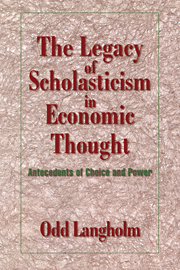Book contents
- Frontmatter
- Contents
- Preface
- Introduction
- I COMPULSION AND THE WILL: THREE ANCIENT TRADITIONS
- II NEED AS COMPULSION: THE SCHOLASTIC PARADIGM
- III REJECTION AND REVIVAL IN POSTSCHOLASTIC THOUGHT
- 8 Hobbes: the antithesis
- 9 The economics of natural law
- 10 The neoclassical system and its critics
- Bibliography
- Index
9 - The economics of natural law
Published online by Cambridge University Press: 13 March 2010
- Frontmatter
- Contents
- Preface
- Introduction
- I COMPULSION AND THE WILL: THREE ANCIENT TRADITIONS
- II NEED AS COMPULSION: THE SCHOLASTIC PARADIGM
- III REJECTION AND REVIVAL IN POSTSCHOLASTIC THOUGHT
- 8 Hobbes: the antithesis
- 9 The economics of natural law
- 10 The neoclassical system and its critics
- Bibliography
- Index
Summary
Natural law
The transition from medieval to modern thought on the economic subjects analyzed in this book is considered, by most doctrinal historians, to be related to a development in the theory of natural law. Thomas Hobbes is not in the mainstream of this development. In some respects, his approach harks back to that of the scholastics. Repeatedly, the various natural laws enumerated by him are crystallized in the Golden Rule of Reciprocity. Almost exactly half a millennium before the publication of De cive, Gratian defined natural law on the opening page of the Decretum: “Natural law is that which is contained in the Scriptures and the Gospels, by which anyone is commanded to do to another what he would have done to himself and prohibited to do to another what he would not wish to have done to himself.” In the context in which we quoted Henry of Ghent on economics, he states that “the justice of contracts pertains to natural law.” Peter Olivi, drawing on Henry, in his treatise on buying and selling refers to natural law, which forbids us to do to others what we would not have done to ourselves “according to our just and natural instinct.” It was not least this formal similarity between the traditional natural law approach and that of Hobbes that caused the substance of some of his precepts and the conclusions that he drew from them to appear so outrageous in the eyes of seventeenth-century ecclesiastics and, indeed, in the eyes of most of Hobbes's contemporaries.
- Type
- Chapter
- Information
- The Legacy of Scholasticism in Economic ThoughtAntecedents of Choice and Power, pp. 158 - 177Publisher: Cambridge University PressPrint publication year: 1998

